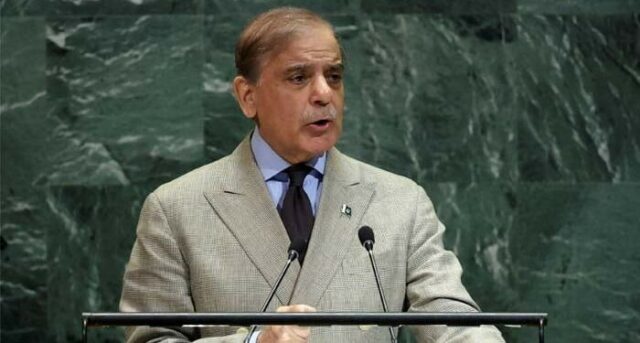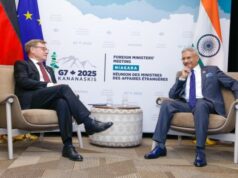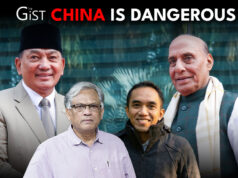When Pakistan Prime Minister Shehbaz Sharif wrapped up his speech at the United Nations General Assembly on Friday, one could almost hear the rustle of old, moth-eaten scripts being dusted off in Islamabad.
But it didn’t take long for India to respond. Exercising its right of reply, First Secretary in India’s Permanent Mission to the UN Petal Gahlot delivered a withering rebuttal that tore apart Sharif’s speech word by word.
Sharif’s UNGA address was a familiar cocktail of grievances: accusations that India was violating the Indus Water Treaty, sermons on Kashmir’s right to self-determination “under UN auspices”, and the obligatory denunciation of “Hindutva extremism”. Gahlot’s reply was not just a rebuttal, it was a demolition job.
Sharif had tried to style himself as a statesman offering dialogue and peace, warning that disputes over Kashmir and water resources remained “volatile”, and vowing that “one day soon, inshallah, India’s tyranny in Kashmir will come to a grinding halt.” But his pitch was immediately undercut by the reality Gahlot spotlighted: Pakistan continues to glorify militants killed in Indian counter-terror operations, paying public tribute to men the rest of the world recognises as terrorists.
If Sharif hoped to impress the UN by invoking U.S. President Donald Trump as a “man of peace” whose “courageous and decisive leadership” had allegedly secured a ceasefire between India and Pakistan, he failed spectacularly. India has flatly, consistently denied any such mediation. The May 2025 cessation of hostilities was the outcome of direct talks between the Directors General of Military Operations of the two countries — nothing more, nothing less. No third party, no magical Trump wand, and certainly no Nobel-worthy diplomacy.
Yet, Islamabad has gone so far as to nominate Trump for the 2026 Nobel Peace Prize, apparently for doing what he never did. It’s the sort of logic only Pakistan could champion: award medals for imagined victories while reality stares back unflatteringly. After all, Army Chief Syed Asim Munir had promoted himself to Field Marshal after Indian missiles flattened several terrorist hideouts and Pakistani airbases during Operation Sindoor in May, in response to the cold-blooded slaughter of 26 civilians in Pahalgam, Kashmir, on 22 April by Pakistani terrorists who targeted Hindu tourists, though a Christian tourist and a local Muslim were also killed.
No Pakistani fantasy would be complete without a symbol to obsess over. Enter the fighter jet lapel pin. When Trump wore the pin during his Oval Office meeting with Sharif and Asim Munir, speculation in Islamabad soared: was this a subtle endorsement of Pakistan’s claim that it had downed multiple Indian jets?
The truth, of course, was more banal — and more embarrassing. Trump had donned the pin earlier in the day during his meeting with Turkish President Recep Tayyip Erdogan, where he was pushing Ankara on the sale of F-16s and F-35s. The pin had nothing to do with Pakistan, India, or any imagined dogfight triumphs. But in Islamabad, self-delusion is a full-time occupation, and the sight of the pin was seized upon as validation. As Gahlot put it, Pakistan’s theatrics cannot substitute for decades of enabling terrorism.
Sharif’s UNGA theatrics were the climax of a months-long charm offensive aimed at Washington. On September 8, he presided over the signing of two MoUs alongside Munir, one of which promised Pakistan would supply critical minerals and rare earth elements to the US — sweetened by a $500 million American investment. This came on the heels of Trump’s July pledge to help Pakistan develop its “massive oil reserves”.
The two countries have also stitched up a trade agreement imposing a 19 per cent tariff on Pakistani imports. By the numbers, US goods and services trade with Pakistan reached USD 10.1 billion in 2024, a 6.3 per cent increase from 2023. US exports to Pakistan grew by 3.3 per cent; imports rose by 4.8 per cent. The overall deficit? A cool USD 3 billion, up nearly 6 per cent.
For Islamabad, however, these numbers are less about trade and more about political oxygen. After years of being cold-shouldered by Washington — former President Joe Biden didn’t bother to even call a Pakistani prime minister during his tenure — Sharif now gets to bask in the glow of three separate Washington visits by Munir and his own White House appearance.
The price? A willingness to let Trump spin fables about having single-handedly stopped a nuclear war in South Asia.
Predictably, Sharif’s UNGA sermon wasn’t all trade deals and Trump worship. The standard playbook was back: Kashmir’s right to self-determination, accusations of India violating the Indus Water Treaty, and dramatic warnings that India’s alleged actions “represent an act of war”.
But as Gahlot’s rebuttal underscored, these claims are neither new nor credible. They are the tired tropes of a state that cannot speak about economic growth, governance, or innovation on the world stage — so it falls back on demonising India.
If Sharif provided the theatre, Defence Minister Khawaja Asif delivered the farce.
Speaking at the UN’s AI Innovation Dialogue earlier, Asif stumbled, stammered, and mispronounced his way into viral infamy. “Risk” became “riks”, “development” turned into “developend”, and “six pillars” emerged as “six pip-pillars”. Social media had a field day: “Operation Sindoor shook him,” quipped one user. “Arre kehna kya chahte ho? (“What exactly do you want to say)?” wondered another.
Amid the laughter, Asif did manage to warn about the dangers of AI in warfare. But his incoherence only reinforced the contrast Gahlot had drawn: India engages the world with facts and accountability; Pakistan with theatrics, delusions, and, increasingly, slapstick.
India’s right of reply ensured that Sharif’s grandstanding did not go unanswered. Gahlot’s blunt words cut through the fog: “Sharif’s attempts to rewrite history, glorify terrorists, and claim unearned credit at international forums is a study in diplomatic delusion. Facts, accountability, and moral clarity do not bend to theatrics.”
That, ultimately, is the difference. Pakistan can drape itself in the illusion of global relevance, pin its hopes on lapel badges, and hail imaginary diplomatic victories. But when confronted with facts — and with India’s refusal to indulge its fantasies — the performance collapses, leaving only the echo of empty rhetoric in the UN chamber.
In a career spanning three decades and counting, Ramananda (Ram to his friends) has been the foreign editor of The Telegraph, Outlook Magazine and the New Indian Express. He helped set up rediff.com’s editorial operations in San Jose and New York, helmed sify.com, and was the founder editor of India.com.
His work has featured in national and international publications like the Al Jazeera Centre for Studies, Global Times and Ashahi Shimbun. But his one constant over all these years, he says, has been the attempt to understand rising India’s place in the world.
He can rustle up a mean salad, his oil-less pepper chicken is to die for, and all it takes is some beer and rhythm and blues to rock his soul.
Talk to him about foreign and strategic affairs, media, South Asia, China, and of course India.





